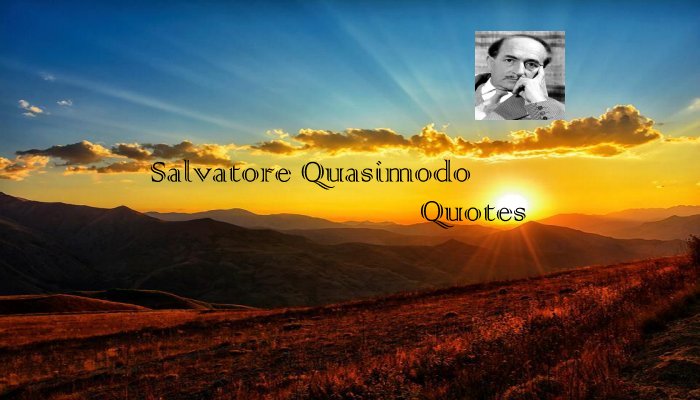
Salvatore Quasimodo was an Italian author and poet. In 1959 he won the Nobel Prize for Literature “for his lyrical poetry, which with classical fire expresses the tragic experience of life in our own times.” Along with Giuseppe Ungaretti and Eugenio Montale, he is one of the foremost Italian poets of the 20th century. Salvatore Quasimodo was introduced to the Scottish Rite Freemasonry by his father, who was a member of the Masonic Lodge “Arnaldo da Brescia.” The Grand Orient of Italy has recognized Quasimodo as one of his most notable brothers.
In the 1950s Quasimodo won the following literary awards: Premio San Babila (1950), Premio Etna-Taormina (1953), Premio Viareggio (1958), and, finally, the Nobel Prize for Literature (1959). In 1960 and 1967 he received honoris causa degrees from the Universities of Messina and Oxford, respectively.
In his last years the poet made numerous voyages to Europe and America, giving public speeches and public lectures of his poems, which had been translated in several foreign languages.
(1901 – 1968)
– Salvatore Quasimodo Quotes –
The poet’s spoken discourse often depends on a mystique, on the spiritual freedom that finds itself enslaved on earth.
Salvatore Quasimodo
Religious poetry, civic poetry, lyric or dramatic poetry are all categories of man’s expression which are valid only if the endorsement of formal content is valid.
Salvatore Quasimodo
The writer of stories or of novels settles on men and imitates them; he exhausts the possibilities of his characters.
Salvatore Quasimodo
The Resistance is a moral certainty, not a poetic one. The true poet never uses words in order to punish someone. His judgment belongs to a creative order; it is not formulated as a prophetic scripture.
Salvatore Quasimodo
He passes from lyric to epic poetry in order to speak about the world and the torment in the world through man, rationally and emotionally. The poet then becomes a danger.
Salvatore Quasimodo
From the night, his solitude, the poet finds day and starts a diary that is lethal to the inert. The dark landscape yields a dialogue.
Salvatore Quasimodo
Poetry is also the physical self of the poet, and it is impossible to separate the poet from his poetry.
Salvatore Quasimodo
Europeans know the importance of the Resistance; it has been the shining example of the modern conscience.
Salvatore Quasimodo
The poet’s other readers are the ancient poets, who look upon the freshly written pages from an incorruptible distance. Their poetic forms are permanent, and it is difficult to create new forms which can approach them.
Salvatore Quasimodo
Religious power, which, as I have already said, frequently identifies itself with political power, has always been a protagonist of this bitter struggle, even when it seemingly was neutral.
Salvatore Quasimodo
According to them, the poet is confined to the provinces with his mouth broken on his own syllabic trapeze.
Salvatore Quasimodo
As the poet has expected, the alarms now are sounded, for – and it must be said again – the birth of a poet is always a threat to the existing cultural order, because he attempts to break through the circle of literary castes to reach the center.
Salvatore Quasimodo
We wrote verses that condemned us, with no hope of pardon, to the most bitter solitude.
Salvatore Quasimodo
In opposition to this detachment, he finds an image of man which contains within itself man’s dreams, man’s illness, man’s redemption from the misery of poverty – poverty which can no longer be for him a sign of the acceptance of life.
Salvatore Quasimodo
After the turbulence of death, moral principles and even religious proofs are called into question.
Salvatore Quasimodo
Poetry is the revelation of a feeling that the poet believes to be interior and personal which the reader recognizes as his own.
Salvatore Quasimodo
War, I have always said, forces men to change their standards, regardless of whether their country has won or lost.
Salvatore Quasimodo
An exact poetic duplication of a man is for the poet a negation of the earth, an impossibility of being, even though his greatest desire is to speak to many men, to unite with them by means of harmonious verses about the truths of the mind or of things.
Salvatore Quasimodo
My readers at that time were still men of letters; but there had to be other people waiting to read my poems.
Salvatore Quasimodo
Thus, the poet’s word is beginning to strike forcefully upon the hearts of all men, while absolute men of letters think that they alone live in the real world.
Salvatore Quasimodo




